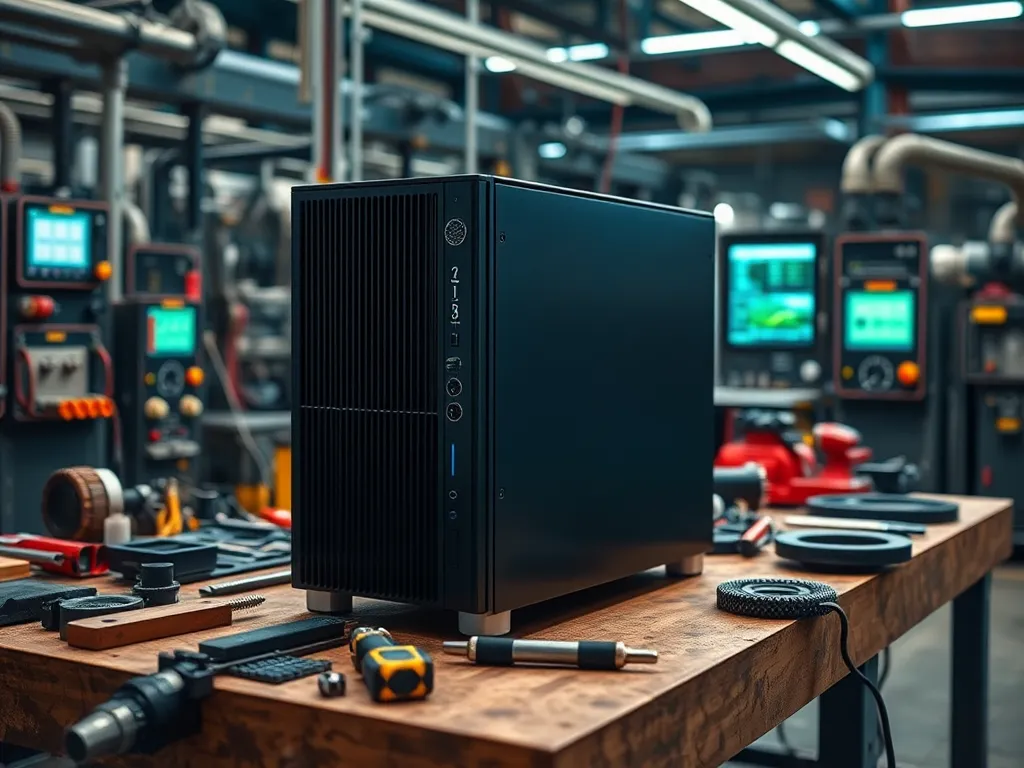Maximize Efficiency with Fanless Industrial PCs: A Complete Guide

Understanding Fanless Industrial PCs: An In-Depth Insight
Fanless Industrial PCs are specialized computing devices designed without traditional cooling fans, making them ideal for various challenging environments. These devices maximize performance while minimizing noise and maintenance, catering to industrial sectors that prioritize reliability and a compact design. Their robust nature allows them to operate effectively in high-temperature or dusty locations, further establishing their importance in modern industry.
Implementing an electrical data logger enables businesses to track energy consumption patterns and improve efficiency effectively.
These PCs are engineered to operate in extreme conditions, often found in manufacturing plants, medical facilities, and transport sectors. Their fanless design eliminates mechanical parts that could fail, thus enhancing their durability and longevity. With heat dissipating through advanced thermal management technologies, Fanless Industrial PCs have become central in automating processes where performance and reliability are crucial.
For accurate temperature monitoring in various applications, a reliable usb temperature sensor is essential for data integrity.
Moreover, Fanless Industrial PCs adhere to various industry standards, ensuring they meet the specific needs of sectors like automation, healthcare, and logistics. Their flexibility allows for easy integration with other devices and systems, reinforcing their position as a backbone for modern industrial applications. As industries evolve and adopt smarter technologies, the importance and utility of Fanless Industrial PCs continue to expand.
In terms of design, Fanless Industrial PCs leverage cutting-edge materials and technology to ensure high performance in demanding situations. From thermal conduction materials to rugged enclosures, every aspect is tailored for operational endurance. This unique design allows these devices to thrive in environments where traditional cooling methods would either fail or require extensive maintenance.
In conclusion, Fanless Industrial PCs represent a significant advancement in industrial computing technology. Their efficient performance, minimal noise, and low maintenance requirements position them as the solution for businesses seeking reliable and durable computing solutions in various industrial applications.
Benefits of Fanless Industrial PCs
One prominent benefit of Fanless Industrial PCs is their lower energy consumption. By operating without mechanical fans, these devices reduce power usage significantly, which is particularly important in energy-intensive industrial applications. Consequently, businesses can achieve lower operational costs while also contributing to sustainability efforts.
Minimized noise pollution is another critical advantage. In an industrial setting, excessive noise can lead to a drop in worker productivity and potential hearing damage over time. With Fanless Industrial PCs, ambient noise is significantly reduced, fostering a better working environment and allowing staff to focus on their tasks without distractions.
Choosing an industrial pc fanless design can significantly enhance system reliability and reduce maintenance needs.
Additionally, Fanless Industrial PCs offer improved reliability in harsh conditions. By eliminating moving parts, these PCs are less prone to mechanical failure, ensuring continuous operation even under strenuous circumstances. This reliability is crucial for operations that rely on technology to function seamlessly.
Moreover, Fanless Industrial PCs can lead to reduced maintenance costs over time. These systems require less frequent servicing than traditional PCs with fans, minimizing downtime and repair expenses. Businesses can allocate resources more efficiently while enjoying a dependable computing infrastructure.
Applications of Fanless Industrial PCs
Fanless Industrial PCs are widely used in manufacturing automation systems, where they control machinery and manage workflows. Their reliable performance under varying conditions makes them ideal for environments where precision and consistency are crucial.
In the medical sector, they are deployed in medical equipment for precise monitoring, data collection, and patient management systems. The lack of fans enhances hygiene as it reduces the accumulation of dust and particles, improving overall system performance and patient safety.
Moreover, in transportation and logistics control, Fanless Industrial PCs assist in tracking inventory, managing shipping logistics, and optimizing routes. Their efficient processing capabilities ensure real-time data availability, which is essential for operational success.
The integration of Fanless Industrial PCs into IoT devices allows for smart monitoring and data analysis. These PCs process vast amounts of data from various sensors, enabling businesses to make informed decisions and automate processes significantly, pushing the boundaries of smart manufacturing and connected operations.
Design and Technology of Fanless Industrial PCs
Thermal management techniques are paramount in Fanless Industrial PCs, ensuring adequate heat dissipation without fans. These may include heat sinks and conduction-based cooling systems that dissipate heat via the chassis. Such approaches maintain optimal operating temperatures for devices in demanding environments.
Fanless Industrial PCs are built with robust construction to withstand extreme conditions. Materials such as aluminum and industrial-grade plastics provide durability, ensuring that the devices operate effectively even in extreme temperatures and vibrations common in industrial settings.
Customization options for specific applications allow industries to tailor Fanless Industrial PCs to meet particular needs. From varying processing power to specific input/output configurations, manufacturers can provide solutions that align with diverse industrial requirements.
A comparison of materials used in fanless designs shows that high-quality materials and engineering techniques are crucial. The choice of materials impacts not only the durability of these PCs but also their thermal performance, making it vital for businesses to understand their options when selecting systems.
Maintenance of Fanless Industrial PCs
To ensure longevity, adopting best practices for maintenance is essential. Regular cleaning, monitoring operating conditions, and implementing software management techniques will ensure that Fanless Industrial PCs operate efficiently and have an extended lifespan.
Troubleshooting common issues without fans is manageable; users should focus on diagnosing problems related to thermal management and software performance. With no moving parts, many issues can often be addressed through software solutions, reducing the need for mechanical intervention.
Software updates and system checks are paramount in maintaining optimal performance. Regular updates ensure that the PCs are equipped with the latest features, improvements, and security enhancements that optimize overall efficiency.
Regular inspections play a crucial role in ensuring that Fanless Industrial PCs remain in good condition. This proactive approach allows businesses to identify and rectify potential issues before they exacerbate, contributing to sustained operational effectiveness.
Future Trends in Fanless Industrial PCs
Emerging technologies are expected to significantly impact fanless designs, incorporating advancements in materials and thermal management systems. Innovations such as nanomaterials could improve heat dissipation and expand the application of Fanless Industrial PCs in even harsher environments.
Predictions for market growth indicate a steadily increasing demand for Fanless Industrial PCs as industries automate and embrace digital transformation. The need for reliable, efficient, and quiet computing solutions will drive growth and innovation in this sector.
Innovations in energy efficiency are vital as businesses strive to reduce their carbon footprints. Fanless Industrial PCs are likely to become leaders in this space as manufacturers develop systems focusing on lower power consumption while maintaining high performance.
Furthermore, potential advancements in materials science, such as lightweight composites and smart materials, could revolutionize the design and functionality of Fanless Industrial PCs, further enhancing their applicability across diverse industrial sectors.
